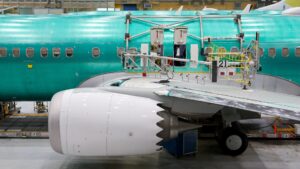Boeing’s Tough Road Ahead: A Year of Challenges and Changes
At Extreme Investor Network, we closely observe the ripple effects of corporate challenges and transformations in the aviation sector, particularly with aviation giant Boeing. As 2024 unfolds, Boeing is no stranger to hurdles, having faced a tumultuous journey marked by safety concerns, financial losses, and significant leadership changes.
A History of Struggles
The spotlight returned to Boeing last year when a serious incident involving an Alaska Airlines Boeing 737 Max 9 ignited fresh discussions about safety and quality. During a flight, a fuselage panel covering an unused emergency exit blew out midair, causing passenger alarm but fortunately leading to a safe emergency landing in Portland, Oregon. Investigations revealed that critical bolts had not been installed before the aircraft left Boeing’s Renton, Washington factory—highlighting systemic issues within the company’s operations.
In response to these events, Boeing’s stock has taken a substantial hit, declining over 30% in the past year, while the S&P 500 enjoyed a rally of nearly 27%. This stark contrast serves as a wake-up call for investors observing Boeing’s waning performance.
Leadership Shifts and Cultural Overhaul
In light of its predicament, Boeing has initiated an aggressive rebuilding campaign under new CEO Kelly Ortberg, who took the helm in August 2024. His appointment followed a significant organizational shake-up, which also saw the introduction of a fresh leadership team, aiming to instill a culture of safety and quality rather than profit maximization.
Boeing has undertaken several measures in this rebuilding effort. These include implementing random quality audits across its factories and addressing employee feedback, all in an effort to improve factory conditions and restore confidence in the company’s output. Among the most notable strategies is the significant reduction of defects in 737 fuselages produced by Spirit AeroSystems, a key supplier, which is being partially bought back by Boeing.
Regulatory Scrutiny and Ongoing Risks
The Federal Aviation Administration (FAA) has increased scrutiny over Boeing’s operations following recent incidents, imposing production limits that still fall below the manufacturer’s previous output levels. FAA Administrator Mike Whitaker emphasized that "enhanced oversight is here to stay," indicating that the road to recovery for Boeing will not be swift. He stated that this transition “requires a fundamental cultural shift at Boeing that’s oriented around safety and quality.”
Boeing’s Financial Landscape
Boeing’s financial trajectory has been dire, as the company has failed to post an annual profit since 2018. That year marked the beginning of two tragic crashes involving the 737 Max, which ultimately led to a worldwide grounding of the fleet for nearly two years. This incident sparked a series of quality issues that have hampered aircraft deliveries across several models including the 787 Dreamliner and the 747, which serves as Air Force One.
Since 2019, the company has suffered over $30 billion in losses, leading to a restructuring of its workforce and operational capabilities. Ortberg recently announced significant workforce cuts, aiming to reduce the headcount by 10% from their 170,000 employees, to refocus on core activities and prioritize quality over expansion.
Response from Industry Stakeholders
Despite the daunting task ahead, there are cautious signs of optimism. Industry leaders like Bob Jordan, CEO of Southwest Airlines—which exclusively operates Boeing 737 aircraft—has noted that while it is early in Boeing’s recovery, he believes Ortberg has a profound understanding of the company’s challenges. "He’s not looking at this as a Band-Aid. He’s aiming for a wholesale change to Boeing," Jordan stated.
Conclusion: A Year of Tactical Recovery
As Boeing works toward stabilization, the focus will inevitably remain on ensuring that its production meets the rigorous standards expected from such a pivotal player in the aviation industry. The road ahead is undeniably fraught with challenges, but with a renewed emphasis on quality, employee engagement, and a cultural shift toward safety, there’s hope that Boeing can navigate through these tumultuous times effectively.
At Extreme Investor Network, we’ll continue to monitor Boeing closely—providing you with insights and analysis as this revitalization strategy unfolds. Follow us for updates on how major corporations like Boeing adapt and evolve in today’s fast-paced and often volatile market landscape.

